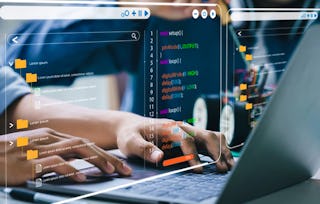Description: This course lays the groundwork for your Python programming journey. You'll learn essential Python syntax, data structures, and control flow, while practicing debugging and basic code optimization techniques.

Python Programming Fundamentals

Python Programming Fundamentals
This course is part of Microsoft Python Development Professional Certificate

Instructor: Microsoft
81,040 already enrolled
Included with
505 reviews
Recommended experience
Skills you'll gain
Details to know

Add to your LinkedIn profile
36 assignments
See how employees at top companies are mastering in-demand skills

Build your Design and Product expertise
- Learn new concepts from industry experts
- Gain a foundational understanding of a subject or tool
- Develop job-relevant skills with hands-on projects
- Earn a shareable career certificate from Microsoft

There are 6 modules in this course
Introduction to Python provides a comprehensive introduction to the world of Python programming. It begins by welcoming learners to the Microsoft Python Developer Certification program and providing an overview of the course structure and expectations. Learners are then introduced to the fundamental concepts of programming, including how computers interpret instructions and the role of programming languages. The module emphasizes Python's suitability for beginners due to its readability and versatility, showcasing real-world examples of its applications in web development, data science, and machine learning. Learners get hands-on experience by running a simple Python program and modifying it to understand basic syntax. The module also covers essential tools, guiding learners through the installation of Python and Jupyter Notebook, a popular Integrated Development Environment (IDE). Finally, learners take their first steps in coding by writing a "Hello, World!" program, exploring variables, data types, and basic operations. By the end of Module 1, learners gain a solid understanding of Python's capabilities and are equipped with the necessary tools and foundational knowledge to embark on their coding journey.
What's included
12 videos9 readings5 assignments1 discussion prompt
Module 2, "Python Basics," provides a foundational understanding of core programming concepts in Python. Learners will first delve into the control flow mechanisms, mastering conditional statements (if, else, elif) to enable decision-making within their programs. They will then explore loops (for, while) to efficiently handle repetitive tasks and iterate through data. Through hands-on exercises and coding challenges, learners will gain practical experience in applying these concepts. The module also emphasizes the importance of organized data, introducing lists as a fundamental data structure for storing and manipulating ordered sequences of information. Learners will discover how to create, modify, and access list elements, building a strong foundation for managing data in their Python programs. By the end of this module, learners will be equipped to write Python code that executes logically and efficiently, incorporating both control flow structures and basic data organization techniques.
What's included
4 videos6 readings5 assignments
Module 3 examines the core concepts of functions and modules in Python, providing learners with the skills to write reusable, organized, and efficient code. It starts by introducing functions as the fundamental building blocks of any Python program, explaining their syntax, and guiding learners to write their first function. The module then expands on this foundation by exploring classes as blueprints for objects and demonstrating how to define and instantiate them. The DRY (Don't Repeat Yourself) principle is emphasized, highlighting the importance of code reusability and how functions achieve this. Learners will also become familiar with Python's built-in functions and engage in hands-on activities to solidify their understanding. Moving further, the module explores the practical application of functions, including defining arguments, return values, and best practices for writing efficient and readable functions. Learners will gain experience in creating custom classes with attributes and methods, applying these concepts through coding exercises. The module then challenges learners to think like programmers by breaking down real-world problems into smaller, manageable functions, fostering modularity and code organization. Finally, the module broadens the learners' toolkit by introducing built-in and external modules, explaining how to import and utilize them effectively. Learners will explore popular libraries for various tasks and gain proficiency in managing packages with pip, the Python package installer. The module culminates with a hands-on challenge where learners create their own module, demonstrating their comprehensive understanding of the concepts covered.
What's included
11 videos9 readings8 assignments1 ungraded lab
This module provides a comprehensive introduction to data structures in Python, focusing on their practical application in real-world scenarios. Learners will explore fundamental data structures like lists, dictionaries, and sets, understanding their unique properties and use cases. Through hands-on exercises and engaging examples, they will develop the skills to select, create, manipulate, and optimize data structures for various programming tasks. The module also delves into algorithms, specifically sorting and searching, demonstrating how they interact with data structures to solve problems efficiently. By the end of this module, learners will be proficient in utilizing data structures to organize, manage, and process information effectively in their Python programs.
What's included
12 videos6 readings7 assignments
This module explores the crucial skill of debugging and error handling in Python. Learners will begin by understanding the nature of exceptions, those pesky red flags that signal problems in code. They'll explore common Python exceptions, learning to identify their causes and implement solutions. The module then introduces a variety of debugging techniques, from the simplicity of print statements to the power of interactive debuggers. Learners will gain hands-on experience with these tools, stepping through code, inspecting variables, and pinpointing errors. The concept of exception handling is then demystified, with the try-except block taking center stage. Real-world examples illustrate how to gracefully handle errors and prevent program crashes. Finally, the module emphasizes a systematic approach to debugging, guiding learners to become effective code detectives. They'll learn to analyze error messages, utilize online resources, and adopt strategies used by seasoned developers.
What's included
10 videos4 readings6 assignments
This module provides a crucial introduction to software testing and version control, essential skills for any aspiring Python developer. Learners will first delve into the world of unit testing, understanding its importance in ensuring code quality and reducing errors. They will explore the pytest framework, learning how to write and execute tests effectively. The module then shifts focus to version control with Git, teaching learners how to track changes, collaborate seamlessly, and manage their codebase efficiently. Finally, learners will apply this knowledge to build a professional portfolio on GitHub, showcasing their skills and projects to potential employers. This module emphasizes hands-on learning through demos, activities, and practical exercises, ensuring learners gain a solid understanding of these fundamental concepts.
What's included
10 videos10 readings5 assignments1 programming assignment
Earn a career certificate
Add this credential to your LinkedIn profile, resume, or CV. Share it on social media and in your performance review.
Explore more from Design and Product
 Status: Free Trial
Status: Free TrialDuke University
 Status: Free Trial
Status: Free Trial Status: Preview
Status: PreviewSimplilearn
 Status: Free Trial
Status: Free Trial
Why people choose Coursera for their career

Felipe M.

Jennifer J.

Larry W.

Chaitanya A.
Learner reviews
- 5 stars
71.20%
- 4 stars
19.72%
- 3 stars
3.55%
- 2 stars
0.78%
- 1 star
4.73%
Showing 3 of 505
Reviewed on Jun 11, 2025
I am glad I took this course. It helped me get a good foundation for the next phase
Reviewed on Apr 12, 2025
Excellent—as long as it isn’t your first course. This course heavily relies on students’ interest and their desire to explore independently. Many topics are introduced, but not elaborated on.
Reviewed on May 5, 2025
Course assumes Learner already knew about python and taught based on that but mentined for beginner level.

Open new doors with Coursera Plus
Unlimited access to 10,000+ world-class courses, hands-on projects, and job-ready certificate programs - all included in your subscription
Advance your career with an online degree
Earn a degree from world-class universities - 100% online
Join over 3,400 global companies that choose Coursera for Business
Upskill your employees to excel in the digital economy
Frequently asked questions
To access the course materials, assignments and to earn a Certificate, you will need to purchase the Certificate experience when you enroll in a course. You can try a Free Trial instead, or apply for Financial Aid. The course may offer 'Full Course, No Certificate' instead. This option lets you see all course materials, submit required assessments, and get a final grade. This also means that you will not be able to purchase a Certificate experience.
When you enroll in the course, you get access to all of the courses in the Certificate, and you earn a certificate when you complete the work. Your electronic Certificate will be added to your Accomplishments page - from there, you can print your Certificate or add it to your LinkedIn profile.
More questions
Financial aid available,

